House of Incest Read online
House of Incest
Anaïs Nin
Originally published in 1936, House of Incest is Anaïs Nin’s first work of fiction. The novel is a surrealistic look within the narrator’s subconscious mind as she attempts to escape from a dream in which she is trapped, or in Nin’s words, as she attempts to escape from “the woman’s season in hell.” In the documentary Anaïs Observed, Nin says House of Incest was based on dreams she’d had for more than a year. Nin’s usage of the word incest in this case is metaphorical, not literal. In this book the word incest describes a selfish love where one can appreciate in another only that which is similar to oneself. One is then only loving oneself, shunning all differences. At first, such a self-love can seem ideal because it is without fear and without risk. But eventually it becomes a sterile nightmare.
Review
“House of Incest is a strange and challenging work that demands the full attention of the reader. It is not so much a story of people (although it certainly is that) as it is a visit into the hellish nightmare of the narrator’s experience from which she emerges satisfactorily. But, however one approaches the work, House of Incest is Nin’s best work of fiction and one that contains most of her basic themes, images and patterns that she would use in her later work.”
—Benjamin Franklin and Duane Schneider
Anaïs Nin
HOUSE OF INCEST
ALL THAT I KNOW IS CONTAINED IN THIS BOOK WRITTEN WITHOUT WITNESS, AN EDIFICE WITHOUT DIMENSION, A CITY HANGING IN THE SKY.
The morning I got up to begin this book I coughed. Something was coming out of my throat: it was strangling me. I broke the thread which held it and yanked it out. I went back to bed and said: I have just spat out my heart.
There is an instrument called the quena made of human bones. It owes its origin to the worship of an Indian for his mistress. When she died he made a flute out of her bones. The quena has a more penetrating, more haunting sound than the ordinary flute.
Those who write know the process. I thought of it as I was spitting out my heart.
Only I do not wait for my love to die.
My first vision of earth was water veiled. I am of the race of men and women who see all things through this curtain of sea, and my eyes are the color of water.
I looked with chameleon eyes upon the changing face of the world, looked with anonymous vision upon my uncompleted self.
I remember my first birth in water. All round me a sulphurous transparency and my bones move as if made of rubber. I sway and float, stand on boneless toes listening for distant sounds, sounds beyond the reach of human ears, see things beyond the reach of human eyes. Born full of memories of the bells of the Atlantide.
Always listening for lost sounds and searching for lost colors, standing forever on the threshold like one troubled with memories, and walking with a swimming stride. I cut the air with wide-slicing fins, and swim through wall-less rooms.
Ejecfrom a paradise of soundlessness, cathedrals wavering at the passage of a body, like soundless music.
This Atlantide could be found again only at night, by the route of the dream. As soon as sleep covered the rigid new city, the rigidity of the new world, the heaviest portals slid open on smooth-oiled gongs and one entered the voicelessness of the dream. The terror and joy of murders accomplished in silence, in the silence of slidings and brushings. The blanket of water lying over all things stifling the voice. Only a monster brought me up on the surface by accident.
Lost in the colors of the Atlantide, the colors running into one another without frontiers. Fishes made of velvet, of organdie with lace fangs, made of spangled taffeta, of silks and feathers and whiskers, with lacquered flanks and rock crystal eyes, fishes of withered leather with gooseberry eyes, eyes like the white of egg. Flowers palpitating on stalks like sea-hearts. None of them feeling their own weight, the sea-horse moving like a feather…
It was like yawning. I loved the ease and the blindness and the suave voyages on the water bearing one through obstacles. The water was there to bear one like a giant bosom; there was always the water to rest on, and the water transmitted the lives and the loves, the words and the thoughts.
Far beneath the level of storms I slept. I moved within color and music as inside a sea-diamond. There were no currents of thoughts, only the caress of flow and desire mingling, touching, traveling, withdrawing, wandering—the endless bottoms of peace.
I do not remember being cold there, nor warm. No pain of cold and heat. The temperature of sleep, feverless and chilless. I do not remember being hungry. Food seeped through invisible pores. I do not remember weeping.
I felt only the caress of moving—moving into the body of another—absorbed and lost within the flesh of another lulled by the rhythm of water, the slow palpitation of the senses, the movement of silk.
Loving without knowingness, moving without effort, in the soft current of water and desire, breathing in an ecstasy of dissolution.
I awoke at dawn, thrown up on a rock, the skeleton of a ship choked in its own sails.
The night surrounded me, a photograph unglued from its frame. The lining of a coat ripped open like the two shells of an oyster. The day and night unglued, and I falling in between not knowing on which layer I was resting, whether it was the cold grey upper leaf of dawn, or the dark layer of night.
Sabina’s face was suspended in the darkness of the garden. From the eyes a simoun wind shriveled the leaves and turned the earth over; all things which had run a vertical course now turned in circles, round the face, around HER face. She stared with such an ancient stare, heavy luxuriant centuries flickering in deep processions. From her nacreous skin perfumes spiraled like incense. Every gesture she made quickened the rhythm of the blood and aroused a beat chant like the beat of the heart of the desert, a chant which was the sound of her feet treading down into the blood the imprint of . The tee.
A voice that had traversed the centuries, so heavy it broke what it touched, so heavy I feared it would ring in me with eternal resonance; a voice rusty with the sound of curses and the hoarse cries that issue from the delta in the last paroxysm of orgasm.
Her black cape hung like black hair from her shoulders, half-draped, half-floating around her body. The web of her dress moving always a moment before she moved, as if aware of her impulses, and stirring long after she was still, like waves ebbing back to the sea. Her sleeves dropped like a sigh and the hem of her dress danced round her feet.
The steel necklace on her throat flashed like summer lightning and the sound of the steel was like the clashing of swords… Le pas d’acier… The steel of New York’s skeleton buried in granite, buried standing up. Le pas d’acier… notes hammered on the steel-stringed guitars of the gypsies, on the steel arms of chairs dulled with her breath; steel mail curtains falling like the flail of hail, steel bars and steel barrage cracking. Her necklace thrown around the world’s neck, unmeltable. She carried it like a trophy wrung of groaning machinery, to match the inhuman rhythm of her march.
The leaf fall of her words, the stained glass hues of her moods, the rust in her voice, the smoke in her mouth, her breath on my vision like human breath blinding a mirror.
Talk—half-talk, phrases that had no need to be finished, abstractions, Chinese bells played on with cotton-tipped sticks, mock orange blossoms painted on porcelain. The muffled, close, half-talk of soft-fleshed women. The men she had embraced, and the women, all washing against the resonance of my memory. Sound within sound, scene within scene, woman within woman—like acid revealing an invisible script. One woman within another eternally, in a far-reaching procession, shattering my mind into fragments, into quarter tones which no orchestral baton can ever make whole again.
The luminous mask of her face, waxy, immob
ile, with eyes like sentinels. Watching my sybaritic walk, and I the sibilance of her tongue. Deep into each other we turned our harlot eyes. She was an idol in Byzance, an idol dancing with legs parted; and I wrote with pollen and honey. The soft secret yielding of woman I carved into men’s brains with copper words; her image I tattooed in their eyes. They were consumed by the fever of their entrails, the indissoluble poison of legends. If the torrent failed to engulf them, or did they extricate themselves, I haunted their memory with the tale they wished to forget. All that was swift and malevolent in woman might be ruthlessly destroyed, but who would destroy the illusion on which I laid her to sleep each night? We lived in Byzance. Sabina and I, until our hearts bled from the precious stones on our foreheads, our bodies tired of the weight of brocades, our nostrils burned with the smoke of perfumes; and when we had passed into other centuries they enclosed us in copper frames. Men recognized her always: the same effulgent face, the same rust voice. And she and I, we recognized each other; I her face and she my legend.
Around my pulse she put a flat steel bracelet and my pulse beat as she willed, losing its human cadence, thumping like a savage in orgiastic frenzy. The lamentations of flutes, the double chant of wind through our slender bones, the cracking of our bones distantly remembered when on beds of down the worship we inspire turned to lust.
As we walked along, rockets burst from the street lamps; we swallowed the asphalt road with a jungle roar and the houses with their closed eyes and geranium eyelashes; swallowed the telegraph poles trembling with messages; swallowed stray cats, trees, hills, hedges, Sabina’s labyrinthian smile on the keyhole. The door moaning, opening. Her smile closed. A nightingale disleafing melliferous honeysuckle. Honey-suckled. Fluted fingers. The house opened its green gate mouth and swallowed us. The bed was floating.
The record was scratched, the crooning broken. The pieces cut our feet. It was dawn and she was lost. I put back the houses on the road, aligned the telegraph poles along the river and the stray cats jumping across the road. I put back the hills. The road came out of my mouth like a velvet ribbon—it lay there serpentine. The houses opened their eyes. The keyhole had an ironic curve, like a question mark. The woman’s mouth.
I was carrying her fetiches, her marionettes, her fortune teller’s cards worn at the corners like the edge of a wave. The windows of the city were stained and splintered with rainlight and the blood she drew from me with each lie, each deception. Beneath the skin of her cheeks I saw ashes: would she die before we had joined in perfidious union? The eyes, the hands, the senses that only women have.
There is no mockery between women. One lies down at peace as on one’s own breast.
Sabina was no longer embracing men and women. Within the fever of her restlessness the world was losing its human shape. She was losing the human power to fit body to body in human completeness. She was delimiting the horizons, sinking into planets without axis, losing her polarity and the divine knowledge of integration, of fusion. She was spreading herself like the night over the universe and found no god to lie with. The other half belonged to the sun, and she was at war with the sun and light. She would tolerate no bars of light on open books, no orchestration of ideas knitted by a single theme; she would not be covered by the sun, and half the universe belonged to him; she was turning her serpent back to that alone which might overshadow her own stature giving her the joy of fecundation.
Come away with me, Sabina, come to my island. Come to my island of red peppers sizzling over slow braseros, Moorish earthen jars catching the gold water, palm trees, wild cats fighting, at dawn a donkey sobbing, feet on coral reefs and sea-anemones, the body covered with long seaweeds, Melisande’s hair hanging over the balcony at the Opera Comique, inexorable diamond sunlight, heavy nerveless hours in the violaceous shadows, ash-colored rocks and olive trees, lemon trees with lemons hung like lanterns at a garden party, bamboo shoots forever trembling, soft-sounding espadrilles, pomegranate spurting blood, a flute-like Moorish chant, long and insistent, of the ploughmen, trilling, swearing, trilling and cursing, dropping perspiration on the earth with the seeds.
Your beauty drowns me, drowns the core of me. When your beauty burns me I dissolve as I never dissolved before man. From all men I was different, and myself, but I see in you that part of me which is you. I feel you in me; I feel my own voice becoming heavier, as if I were drinking you in, every delicate thread of resemblance being soldered by fire and one no longer detects the fissure.
Your lies are not lies, Sabina. They are arrows flung out of your orbit by the strength of your fantasy. To nourish illusion. To destroy reality. I will help you: it is I who will invent lies for you and with them we will traverse the world. But behind our lies I am dropping Ariadne’s golden thread—for the greatest of all joys is to be able to retrace one’s lies, to return to the source and sleep one night a year washed of all superstructures.
Sabina, you made your impression upon the world. I passed through it like a ghost. Does anyone notice the owl in the tree at night, the bat which strikes the window pane while others are talking, the eyes which reflect like water and drink like blotting paper, the pity which flickers quietly like candlelight, the understanding on which people lay themselves to sleep?
DOES ANYONE KNOW WHO I AM?
Even my voice came from other worlds. I was embalmed in my own secret vertigoes. I was suspended over the world, seeing what road I could tread without treading down even clay or grass. My step was a sentient step; the mere crepitation of gravel could arrest my walk.
When I saw you, Sabina, I chose my body.
I will let you carry me into the fecundity of destruction. I choose a body then, a face, a voice. I become you. And you become me. Silence the sensational course of your body and you will see in me, intact, your own fears, your own pities. You will see love which was excluded from the passions given you, and I will see the passions excluded from love. Step out of your role and rest yourself on the core of your true desires. Cease for a moment your violent deviations. Relinquish the furious indomitable strain.
I will take them up.
Cease trembling and shaking and gasping and cursing and find again your core which I am. Rest from twistedness, distortion, deformations. For an hour you will be me; that is, the other half of yourself. The half you lost. What you burnt, broke, and tore is still in my hands: I am the keeper of fragile things and I have kept of you what is indissoluble.
Even the world and the sun cannot show their two faces at once.
So now we are inextricably woven. I have gathered together all the fragments. I return them to you. You have run with the wind, scattering and dissolving. I have run behind you, like your own shadow, gathering what you have sown in deep coffers.
I AM THE OTHER FACE OF YOU
Our faces are soldered together by soft hair, soldered together, showing two profiles of the same soul. Even when I passed through a room like a breath, I made others uneasy and they knew I had passed.
I was the white flame of your breath, your simoun breath shrivelin the world. I borrowed your visibility and it was through you I made my imprint on the world. I praised my own flame in you.
THIS IS THE BOOK YOU WROTE
AND YOU ARE THE WOMAN
I AM
Only our faces must shine twofold—like day and night—always separated by space and the evolutions of time.
The smoke sent my head to the ceiling: there it hung, looking down upon frog eyes, straw hair, mouth of soiled leather, mirrors of bald heads, furred monkey hands with ham colored palms. The music whipped the past out of its tomb and mummies flagellated my memory.
If Sabina were now a memory; if I should sit here and she should never come again! If I only imagined her one night because the drug made fine incisions and arranged the layers of my body on Persian silk hammocks, tipped with cotton each fine nerve and sent the radium arrows of fantasy through the flesh…
I am freezing and my head falls down through a thin film of smoke. I
am searching for Sabina again with deep anguish through the faceless crowd.
I am ill with the obstinacy of images, reflections in cracked mirrors. I am a woman with Siamese cat eyes smiling always behind my gravest words, mocking my own intensity. I smile because I listen to the OTHER and I believe the OTHER. I am a marionette pulled by unskilled fingers, pulled apart, inharmoniously dislocated; one arm dead, the other rhapsodizing in mid-air. I laugh, not when it fits into my talk, but when it fits into the undercurrents of my talk. I want to know what is running underneath thus punctuated by bitter upheavals. The two currents do not meet. I see two women in me freakishly bound together, like circus twins. I see them tearing away from each other. I can hear the tearing, the anger and love, passion and pity. When the act of dislocation suddenly ceases—or when I cease to be aware of the sound—then the silence is more terrible because there is nothing but insanity around me, the insanity of things pulling, pulling within oneself, the roots tearing at each other to grow separately, the strain made to achieve unity.
It requires only a bar of music to still the dislocation for a moment; but there comes the smile again, and I know that the two of us have leaped beyond cohesion.
Greyness is no ordinary greyness, but a vast lead roof which covers the world like the lid of a soup pan. The breath of human beings is like the steam of a laundry house. The smoke of cigarettes is like a rain of ashes from Vesuvius. The lights taste of sulphur, and each face stares at you with the immensity of its defects. The smallness of a room is like that of an iron cage in which one can neither sit nor lie down. The largeness of other rooms is like a mortal danger always suspended above you, awaiting the moment of your joy to fall. Laughter and tears are not separate experiences, with intervals of rest: they rush out together and it is like walk with a sword between your legs. Rain does not wet your hair but drips in the cells of the brain with the obstinacy of a leak. Snow does not freeze the hands, but like ether distends the lungs until they burst. All the ships are sinking with fire in their bowels, and there are fires hissing in the cellars of every house. The loved one’s whitest flesh is what the broken glass will cut and the wheel crush. The long howls in the night are howls of death. Night is the collaborator of torturers. Day is the light on harrowing discoveries. If a dog barks it is the man who loves wide gashes leaping in through the window. Laughter precedes hysteria. I am waiting for the heavy fall and the foam at the mouth.

 Diary of Anais Nin, Volume 5
Diary of Anais Nin, Volume 5 A Spy in the House of Love
A Spy in the House of Love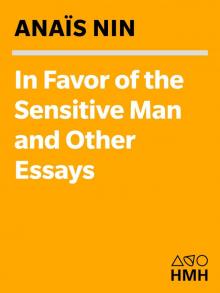 In Favor of the Sensitive Man and Other Essays (Original Harvest Book; Hb333)
In Favor of the Sensitive Man and Other Essays (Original Harvest Book; Hb333)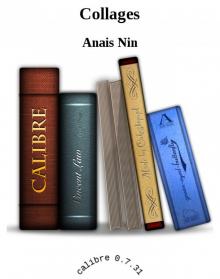 Collages
Collages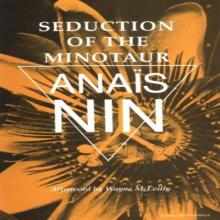 Seduction of the Minotaur
Seduction of the Minotaur Children of the Albatross
Children of the Albatross Delta of Venus
Delta of Venus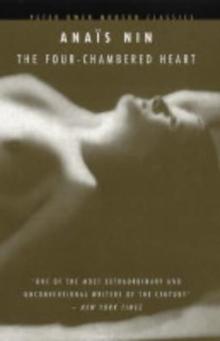 The Four-Chambered Heart coti-3
The Four-Chambered Heart coti-3 Diary of Anais Nin, Volume 2
Diary of Anais Nin, Volume 2 Diary of Anais Nin, Volume 1
Diary of Anais Nin, Volume 1 Diary of Anais Nin, Volume 4
Diary of Anais Nin, Volume 4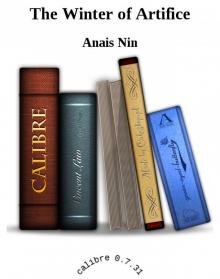 The Winter of Artifice
The Winter of Artifice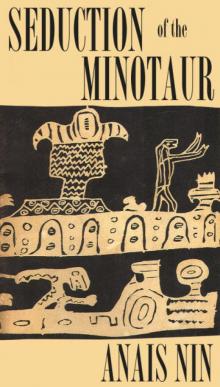 Seduction of the Minotaur coti-5
Seduction of the Minotaur coti-5 Children of the Albatross coti-2
Children of the Albatross coti-2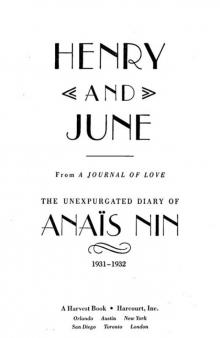 Henry and June: From A Journal of Love -The Unexpurgated Diary of Anaïs Nin (1931-1932)
Henry and June: From A Journal of Love -The Unexpurgated Diary of Anaïs Nin (1931-1932) Ladders to Fire
Ladders to Fire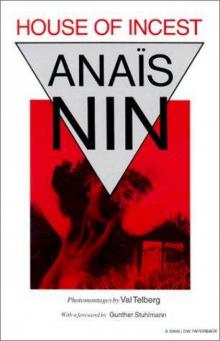 House of Incest
House of Incest